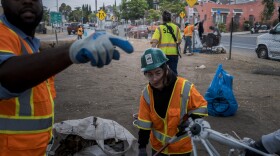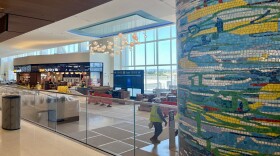In a small, bare meeting room in the city of El Cajon, a dozen newly arrived refugees are learning how to job network. The well-dressed group of men and women included several engineers, a nurse, an anesthesiologist and a dentist.
Most of them were from Iraq.
“Ok, so if you could start by listing everybody that you know," Heidi Vandenburg, a job development worker with Jewish Family Services, instructed the group. "Everybody that you could talk to about a job, that has a job, that knows people with a job."
Some began scribbling names on pieces of paper. Others looked doubtfully at Vandenburg and her co-workshop leader, Thuba Nguyen, from International Rescue Committee.
“But they’re not from our field,” protested one man. “You know, just a friend.”
“Right, so just list down the folks you know,” Vandenburg said. “And then we’ll talk about it."
The workshop was a training session to get the new arrivals ready for an International Night of Networking, an event put on by local refugee resettlement agencies to connect highly skilled refugees with potential employers.
In the past, most refugees came to San Diego from rural areas, according to Ralph Achenbach, chairman of the San Diego Refugee Forum. They may have had few years of formal education and minimal job skills for a modern, urban area.
But the recently arrived Iraqis are different.
“We see in that population, many with professional credentials, advanced degrees and accomplished careers in their home countries,” Achenbach said.
That doesn’t mean it’s easier for them to find jobs – at least not these days.
Take Salih Habib, an IT specialist and graphic designer from Baghdad. He was employed by several large American companies in Iraq, and even worked as an Arabic-English interpreter for the U.S. military. He came to San Diego a year ago, and still hasn’t found a job.
“I don’t know why. Maybe it’s hard luck, or I don’t know, the situation in San Diego,” Habib said resignedly, following the workshop. “Or maybe it’s because of my age – I’m old, I’m over 50.”
Habib and other refugees face another tall barrier to getting a job.
“When you come here, you have to buy a car, because you can’t find a job without a car," Habib said. "And you can’t buy a car, at the same time, if you don’t have a job.”
Habib said he’d applied for about 100 jobs, and only scored a handful of interviews. When he’s not applying for jobs, he’s busy learning to network.
At the workshop, he practiced his 30-second elevator pitch with Vandenburg:
“Hi, I’m Salih Habib.”
“Hi, I’m Heidi Vandenburg. Nice to meet you."
"Nice to meet you. Actually, I'm looking for a job for an IT tech. I have five years experience. Also I work for many companies, American companies, in this field, in computers and networking. And I'm looking for a good and growing up company to grow with it and learn different experiences. If it's possible with your company – I hear it's a good company – if there are any jobs or positions available...."
A week later, it was the big event – the International Night of Networking. Dark haired men and women in sport coats and suits, with stick-on name tags, wandered around the room. They scanned the names of employers and professional groups written on paper placards at tables. At the front of the room, a projector screen flashed blown-up photos of the job seekers, labeled with their names and professions.
The job seeker sat down to chat with a group of employers. He explained he had a degree in IT from Baghdad University, but employers here wouldn't recognize it – a common problem.
Then he got a promising sign from “Hector,” a partner in a small electronics firm, who said: “Well, send me your résumé. I do know an IT manager. They work for one of those online universities.”
The job seeker then asks “Hector” for his business card to send him a résumé directly. He gets this reply:
“If you don’t mind, just write it down. We’ve created an email at our company...it’s..."
Salih Habib – the other unemployed IT specialist – didn’t leave the networking event with a job. But he did say it was useful.
“Very useful, actually," he said. "Because I make kind of networking with people from two organizations.”
He explained that these were professional organizations of engineers, and they gave him some good ideas about – more networking.
In this job-scarce economy, maybe that’s the name of the game. In the meantime, Habib said he had applied for a security job and a substitute teaching job.
“Well, it’s good,” he said. “Better than nothing.”






